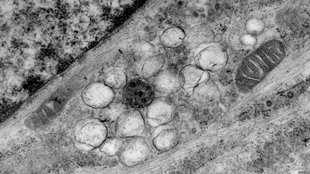 Coronavirus replication vesicles inside host cellVOLKER THIEL, EDWARD TRYBALA Coronaviruses, including the one responsible for the ongoing outbreak of Middle East respiratory syndrome (MERS), can be defeated in a dish by a molecule that destroys their replication vesicles, according to a paper published in PLOS Pathogens today (May 29). The molecule, called K22, is the first antiviral substance known to interfere with such vesicles, revealing them as a novel exploitable weak point in the coronavirus (CoV) life cycle.
Coronavirus replication vesicles inside host cellVOLKER THIEL, EDWARD TRYBALA Coronaviruses, including the one responsible for the ongoing outbreak of Middle East respiratory syndrome (MERS), can be defeated in a dish by a molecule that destroys their replication vesicles, according to a paper published in PLOS Pathogens today (May 29). The molecule, called K22, is the first antiviral substance known to interfere with such vesicles, revealing them as a novel exploitable weak point in the coronavirus (CoV) life cycle.
“There’s no way to treat a virus with just one drug. You need to come at it from a couple of different angles, and this is a brand new fresh angle from which to attack a dangerous pathogen,” said Benjamin Neuman, a molecular virologist at the University of Reading in the U.K., who was not involved in the study. “And it seems to work on all the coronaviruses they tested, which is lovely.”
Until a decade ago, CoVs were not considered a significant threat to human health because the few that did infect humans caused non-life-threatening upper respiratory tract infections (essentially, colds). But then, in 2003, the SARS CoV emerged and killed nearly 10 percent of the people it infected. And the MERS-CoV that’s currently ...






















